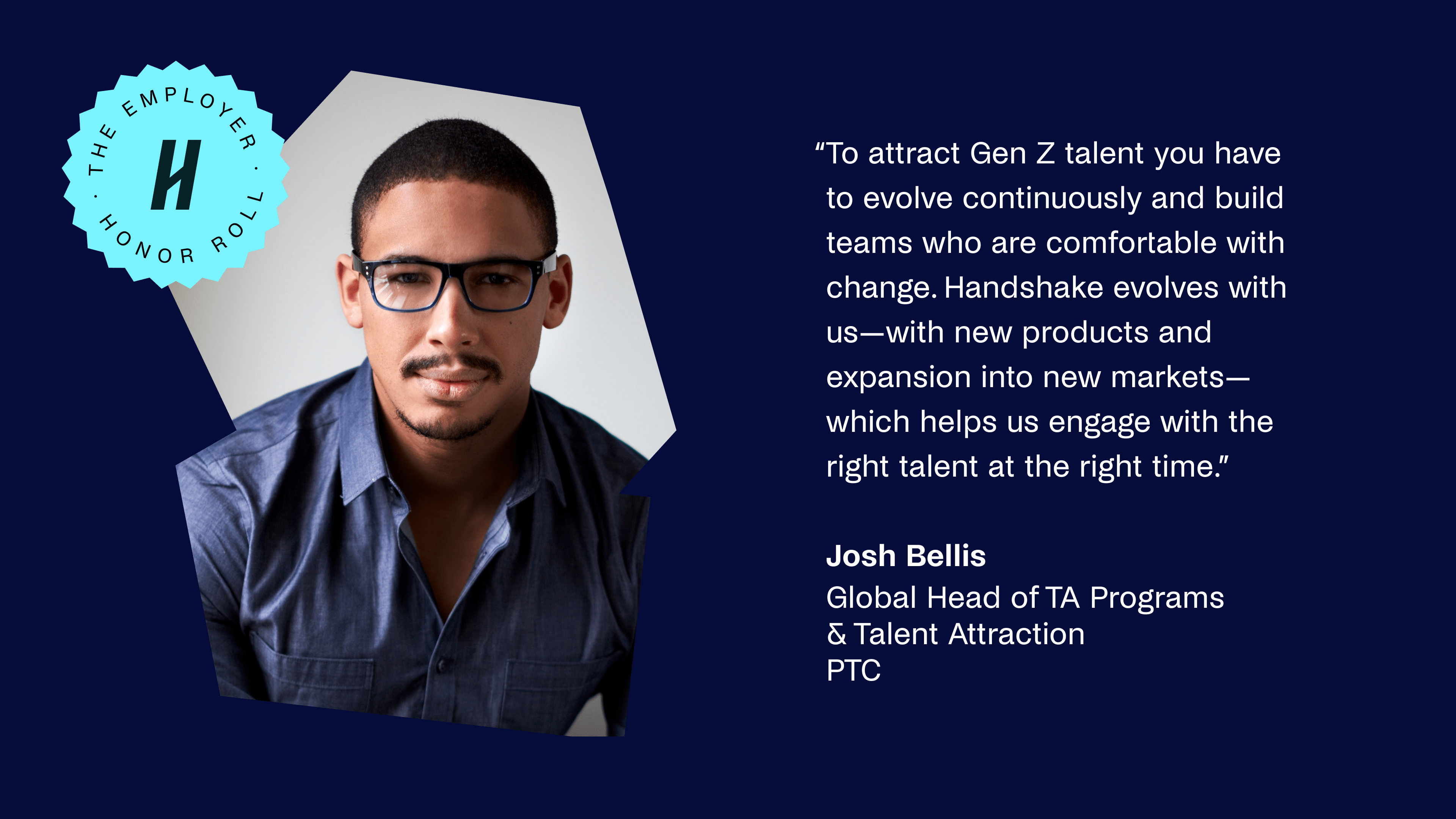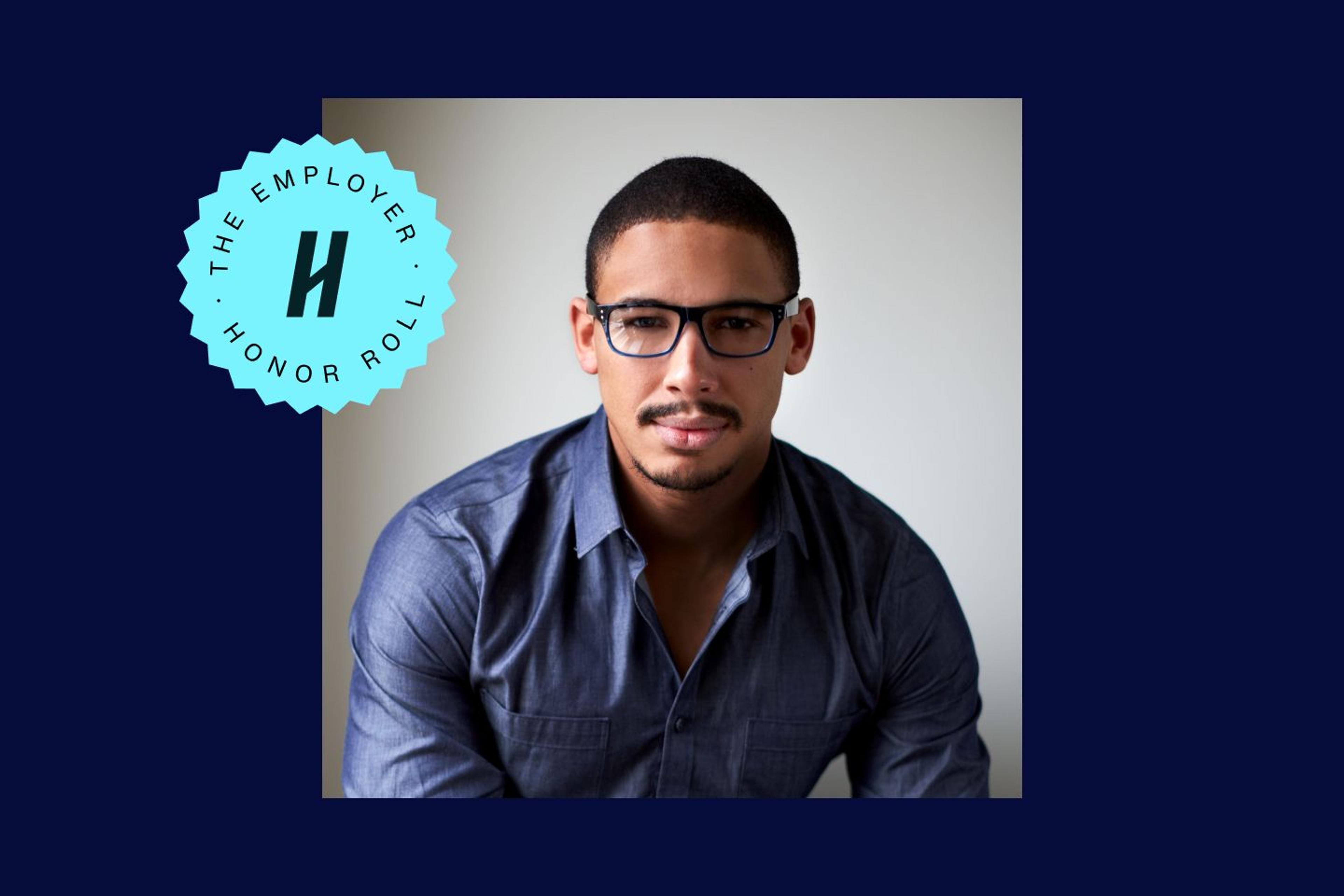Joshua Bellis has been a transformative leader in the talent and HR space for 20+ years. His passion for DEI, employee retention, and talent development is deeply rooted in his career journey, starting with McDonald’s, where he worked his way up from crew member to manager.
He still uses one McDonald’s management concept called "aces in their places" in his roles today. It’s about ensuring your top-performing people are in place to help you provide A+ service during rush hours while pinpointing other times for cross-training and learning.
Today, as Global Head of TA Programs & Talent Attraction at PTC, he leverages this philosophy when helping PTC attract and place the best candidates who are passionate about PTC’s work while also investing in and training tomorrow’s leaders to drive a competitive, bright future.
You have an incredibly thoughtful perspective on measuring quality vs. quantity when recruiting for early talent. Can you share that?
When you only have, for example, 100 internships to offer, and you receive tens of thousands of applicants, I don’t see it as a great thing. Many disagree and love comparing their programs to Ivy League acceptance rates. However, saying "no" to so many deserving and well-qualified students is hard.
I prefer to focus on finding students excited about what we’re doing at PTC. If we have fewer applicants, but they are qualified candidates who care, we can better prioritize providing a great experience, even if we have to say no.
DEI is a core value for PTC. How does your early talent recruitment strategy attract a diverse cohort?
In terms of DEI, it is all about driving an equitable process where each person has the same opportunity to be considered.
If other leaders are struggling with top-of-funnel applicants, consider a different sourcing approach. Typically, I see people recruiting from the same places hoping for different results. Using Handshake, I’m able to showcase my roles at Historically Black Colleges and Universities (HBCUs) and Hispanic Serving Institutions (HSIs) without leaving the office. I challenge people to think outside of that and consider that some of the largest universities have huge gender-diverse and underrepresented populations.
Look for diverse student organizations you can meet with on campus or invite them to your offices for an on-site information session or open house. Keep equity top of mind and insist that every candidate undergo the same process. Once you have a baseline, then examine your hiring funnel. What percentage of candidates did you start with in top-of-funnel, then what percentage moved to an interview, offer, etc.?
The percentages after you have a qualified applicant pool should remain relatively the same. If they aren't, it may require more thoughtful conversations with hiring teams and leaders using the data you have.
PTC does remarkable work around driving digital transformation. But, as more industries need to adopt new technology, how can early talent help?
In terms of early talent, it’s vital that we have a healthy pool of early talent who can bring the latest and greatest in new trends and perspectives to our products to keep a competitive edge.
Additionally, as companies shift to a skills-based talent model, we must constantly consider the skills we have and the ones we will soon need. Upskilling existing workers is part of the plan, but hiring external talent with the skills is another piece that early talent solves for the organization.
My advice to students is that no matter what field you want, make sure you’re studying some aspect of technology. I highly recommend making it a minor or something you are learning about via online courses or bootcamps.
My advice to employers is to understand where future skills will be needed in your organization and use early talent programs to drive that pipeline. Keep in mind early talent programming requires a long-term investment, but the ROI will show as your organization has been preparing and acquiring talent with the needed skills for 5-10 years, and your competitors are just getting started.

What are the biggest challenges and opportunities on the horizon for industries that aren't investing in digital transformation?
The biggest challenge for organizations is change management and getting their workforce technology enabled. The rate of technology is moving so incredibly fast that industries are having problems keeping up, even ones that are already focused on digital transformation.
If you don't have a change management engine in place to manage ongoing change, you may be left in the dust. If you don't even have a digital transformation initiative in place you may have already missed the boat.
And how does PTC's early career program play a role in solving these challenges and seizing these opportunities?
PTC's early career program is focused on serving our business to find great talent who can help us keep up with the rate of technology and, therefore, our customers who depend on our solutions to stay competitive.
What other ways are you driving your team to be more successful?
I have been involved in early talent for 15+ years and have never done a copy/paste job from one year to the next. You have to evolve continuously, which means you must build teams who build that muscle to be comfortable in a constant state of tweaking and changing. Handshake is also evolving with new products and expansion into new markets, all of which are helping us engage with the right talent at the right time.
What’s one of your favorite early talent hire success stories? Or favorite story about an early talent hire that made a huge impact or grew with the company?
Over a decade ago, I was recruiting at Texas A&M University in College Station, TX. I built a pipeline of students there who were great interns and full-time employees.
I hired an intern onto my team who was incredibly talented. My CFO at the time liked to hire early talent for his Executive Assistant role so they could grow to another part of the organization. This was highly successful, and the 3 Executive Assistants I knew are still at the company! I pegged my intern as a perfect candidate for this role. She was skeptical because she was a business major with other offers, and this was an assistant position. Still, I convinced her of the role because she’d be working for one of our top executives, who was known as an incredible mentor. She took the role and now is a Director of HR managing thousands of employees' needs.
There are so many stories and talented interns who are now leading and mentoring others. It is the best part of recruiting at this level seeing the growth and success of these students.
What advice would you offer executives or leaders looking to improve their brand with in-demand Gen Z talent?
Listen to this talent and what they are looking for. They can benefit greatly from the knowledge and tech-savviness of new generations.
I often hear leaders saying, "These new generations don't understand how to work hard or are entitled." But companies have changed too, not just the generations. Not too long ago, companies offered pensions, paid trips, work anniversary gifts, and other recognition that has gone by the wayside.
Leaders can provide what Gen Z wants without breaking the bank. Consider your organization's benefits, tuition reimbursement, and ongoing education allowances. Enhance your internal training and learning programs, internal mobility, and marketplace offerings. In-demand talent is looking to grow and use their skills while learning new ones. It is all about engagement and constant evolution (back to my change-management engine).
